BMP4002 Business Law: UK Legal System, Classifications, Sources
VerifiedAdded on 2023/06/06
|10
|2729
|83
Report
AI Summary
This report provides a comprehensive overview of the UK legal system as it pertains to business law. It begins by defining laws and identifying the legal systems within the UK, further classifying laws into civil and criminal categories with relevant examples. The roles of the High Court and Supreme Court are explained, followed by an examination of case law and legislation as primary sources of law, including a discussion on delegated legislation. The report then delves into the UK law-making process, specifically focusing on employment law, statutory duties of employers, and actions related to wrongful and unfair dismissal. This document aims to provide a clear understanding of the legal framework governing business operations in the UK, and is available on Desklib, a platform providing study tools for students.
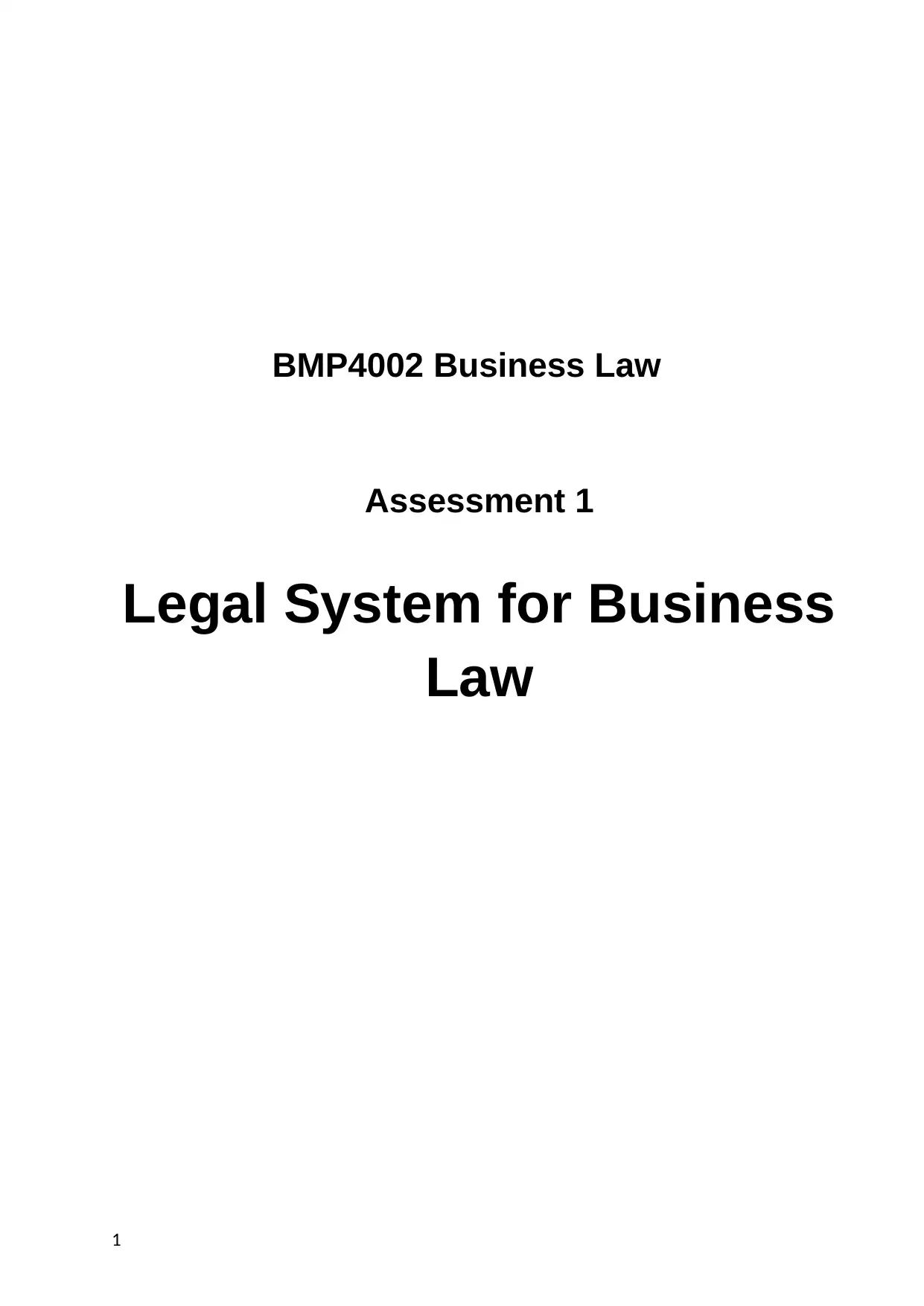
BMP4002 Business Law
Assessment 1
Legal System for Business
Law
1
Assessment 1
Legal System for Business
Law
1
Paraphrase This Document
Need a fresh take? Get an instant paraphrase of this document with our AI Paraphraser
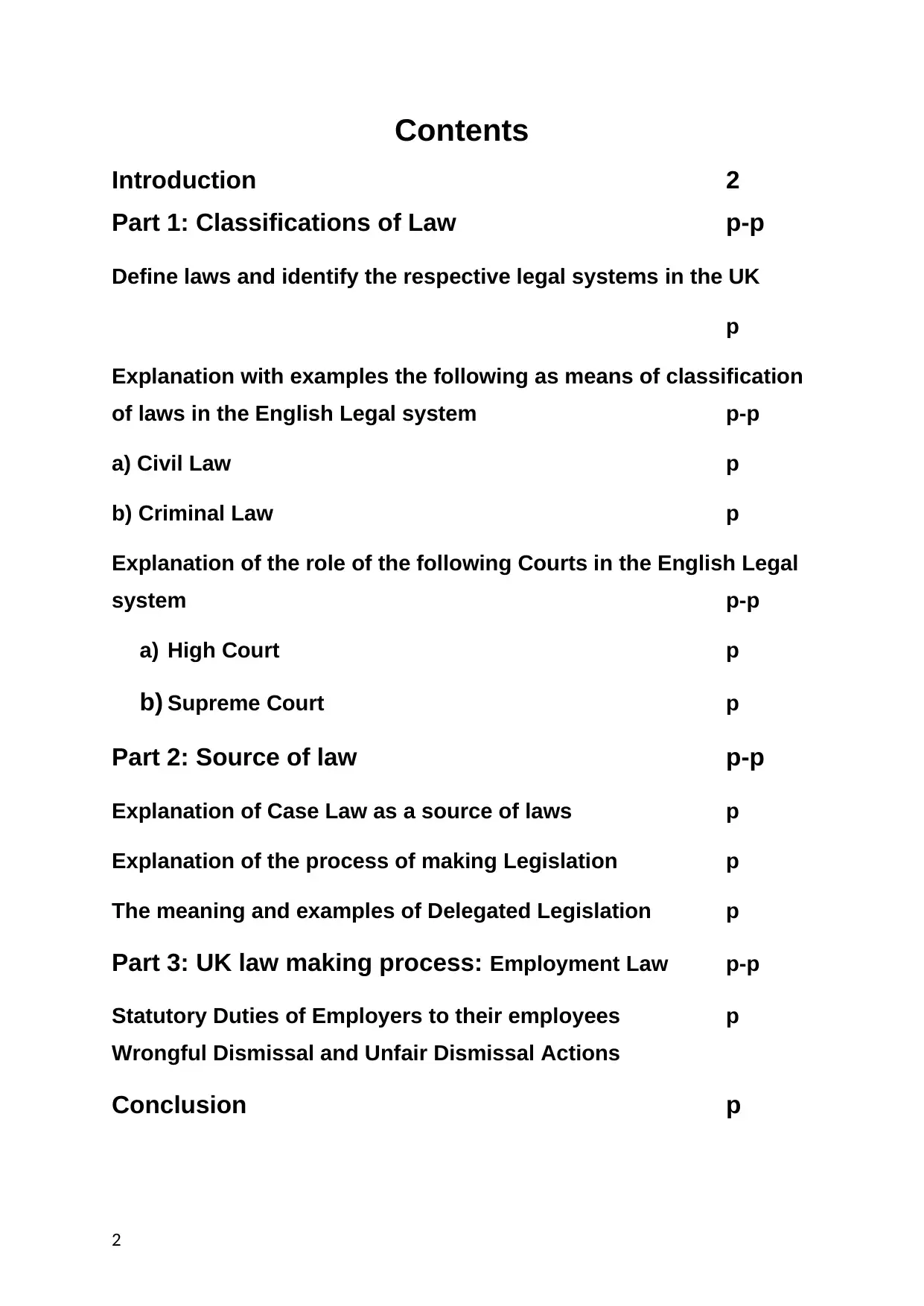
Contents
Introduction 2
Part 1: Classifications of Law p-p
Define laws and identify the respective legal systems in the UK
p
Explanation with examples the following as means of classification
of laws in the English Legal system p-p
a) Civil Law p
b) Criminal Law p
Explanation of the role of the following Courts in the English Legal
system p-p
a) High Court p
b) Supreme Court p
Part 2: Source of law p-p
Explanation of Case Law as a source of laws p
Explanation of the process of making Legislation p
The meaning and examples of Delegated Legislation p
Part 3: UK law making process: Employment Law p-p
Statutory Duties of Employers to their employees p
Wrongful Dismissal and Unfair Dismissal Actions
Conclusion p
2
Introduction 2
Part 1: Classifications of Law p-p
Define laws and identify the respective legal systems in the UK
p
Explanation with examples the following as means of classification
of laws in the English Legal system p-p
a) Civil Law p
b) Criminal Law p
Explanation of the role of the following Courts in the English Legal
system p-p
a) High Court p
b) Supreme Court p
Part 2: Source of law p-p
Explanation of Case Law as a source of laws p
Explanation of the process of making Legislation p
The meaning and examples of Delegated Legislation p
Part 3: UK law making process: Employment Law p-p
Statutory Duties of Employers to their employees p
Wrongful Dismissal and Unfair Dismissal Actions
Conclusion p
2

3
⊘ This is a preview!⊘
Do you want full access?
Subscribe today to unlock all pages.

Trusted by 1+ million students worldwide
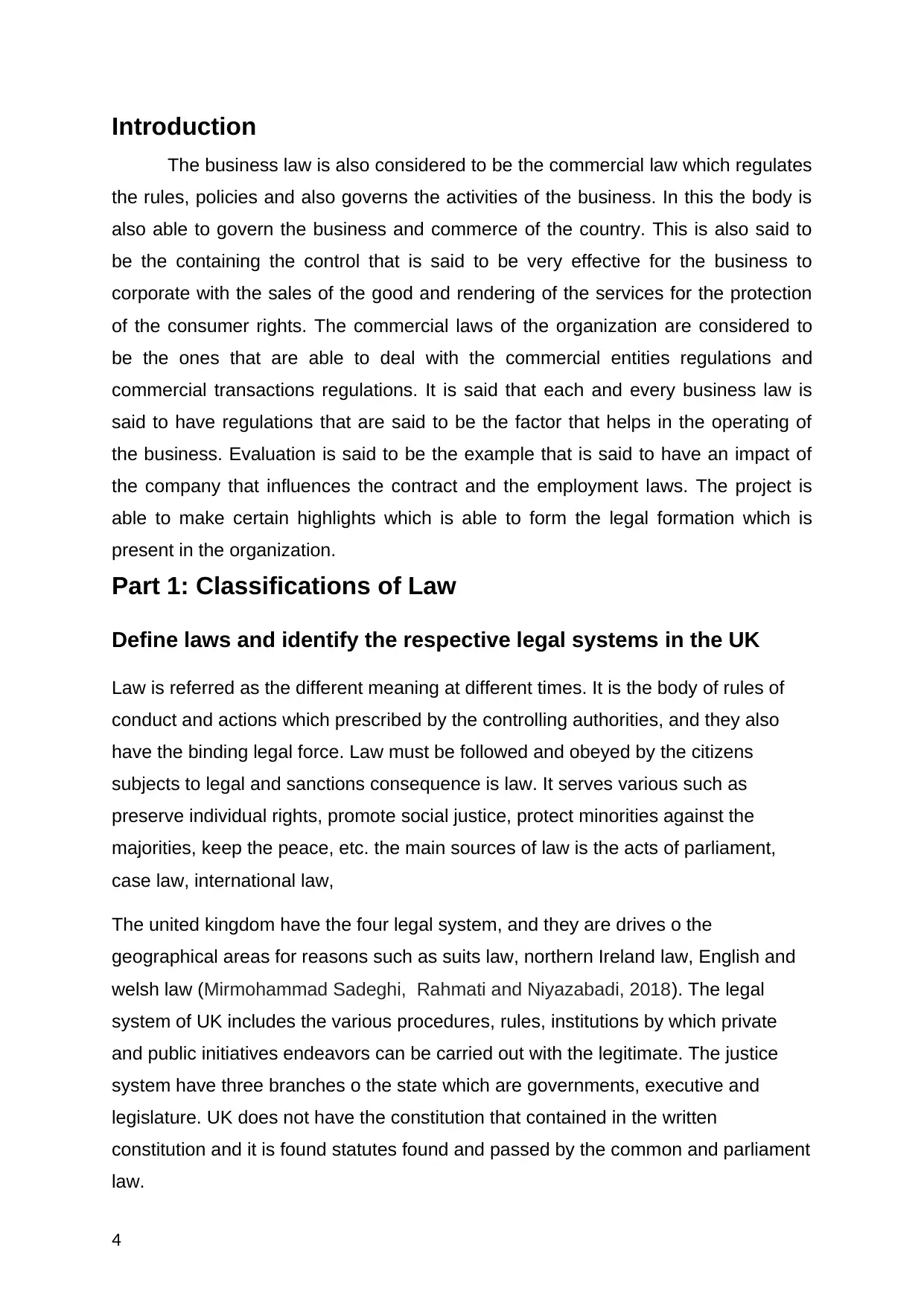
Introduction
The business law is also considered to be the commercial law which regulates
the rules, policies and also governs the activities of the business. In this the body is
also able to govern the business and commerce of the country. This is also said to
be the containing the control that is said to be very effective for the business to
corporate with the sales of the good and rendering of the services for the protection
of the consumer rights. The commercial laws of the organization are considered to
be the ones that are able to deal with the commercial entities regulations and
commercial transactions regulations. It is said that each and every business law is
said to have regulations that are said to be the factor that helps in the operating of
the business. Evaluation is said to be the example that is said to have an impact of
the company that influences the contract and the employment laws. The project is
able to make certain highlights which is able to form the legal formation which is
present in the organization.
Part 1: Classifications of Law
Define laws and identify the respective legal systems in the UK
Law is referred as the different meaning at different times. It is the body of rules of
conduct and actions which prescribed by the controlling authorities, and they also
have the binding legal force. Law must be followed and obeyed by the citizens
subjects to legal and sanctions consequence is law. It serves various such as
preserve individual rights, promote social justice, protect minorities against the
majorities, keep the peace, etc. the main sources of law is the acts of parliament,
case law, international law,
The united kingdom have the four legal system, and they are drives o the
geographical areas for reasons such as suits law, northern Ireland law, English and
welsh law (Mirmohammad Sadeghi, Rahmati and Niyazabadi, 2018). The legal
system of UK includes the various procedures, rules, institutions by which private
and public initiatives endeavors can be carried out with the legitimate. The justice
system have three branches o the state which are governments, executive and
legislature. UK does not have the constitution that contained in the written
constitution and it is found statutes found and passed by the common and parliament
law.
4
The business law is also considered to be the commercial law which regulates
the rules, policies and also governs the activities of the business. In this the body is
also able to govern the business and commerce of the country. This is also said to
be the containing the control that is said to be very effective for the business to
corporate with the sales of the good and rendering of the services for the protection
of the consumer rights. The commercial laws of the organization are considered to
be the ones that are able to deal with the commercial entities regulations and
commercial transactions regulations. It is said that each and every business law is
said to have regulations that are said to be the factor that helps in the operating of
the business. Evaluation is said to be the example that is said to have an impact of
the company that influences the contract and the employment laws. The project is
able to make certain highlights which is able to form the legal formation which is
present in the organization.
Part 1: Classifications of Law
Define laws and identify the respective legal systems in the UK
Law is referred as the different meaning at different times. It is the body of rules of
conduct and actions which prescribed by the controlling authorities, and they also
have the binding legal force. Law must be followed and obeyed by the citizens
subjects to legal and sanctions consequence is law. It serves various such as
preserve individual rights, promote social justice, protect minorities against the
majorities, keep the peace, etc. the main sources of law is the acts of parliament,
case law, international law,
The united kingdom have the four legal system, and they are drives o the
geographical areas for reasons such as suits law, northern Ireland law, English and
welsh law (Mirmohammad Sadeghi, Rahmati and Niyazabadi, 2018). The legal
system of UK includes the various procedures, rules, institutions by which private
and public initiatives endeavors can be carried out with the legitimate. The justice
system have three branches o the state which are governments, executive and
legislature. UK does not have the constitution that contained in the written
constitution and it is found statutes found and passed by the common and parliament
law.
4
Paraphrase This Document
Need a fresh take? Get an instant paraphrase of this document with our AI Paraphraser
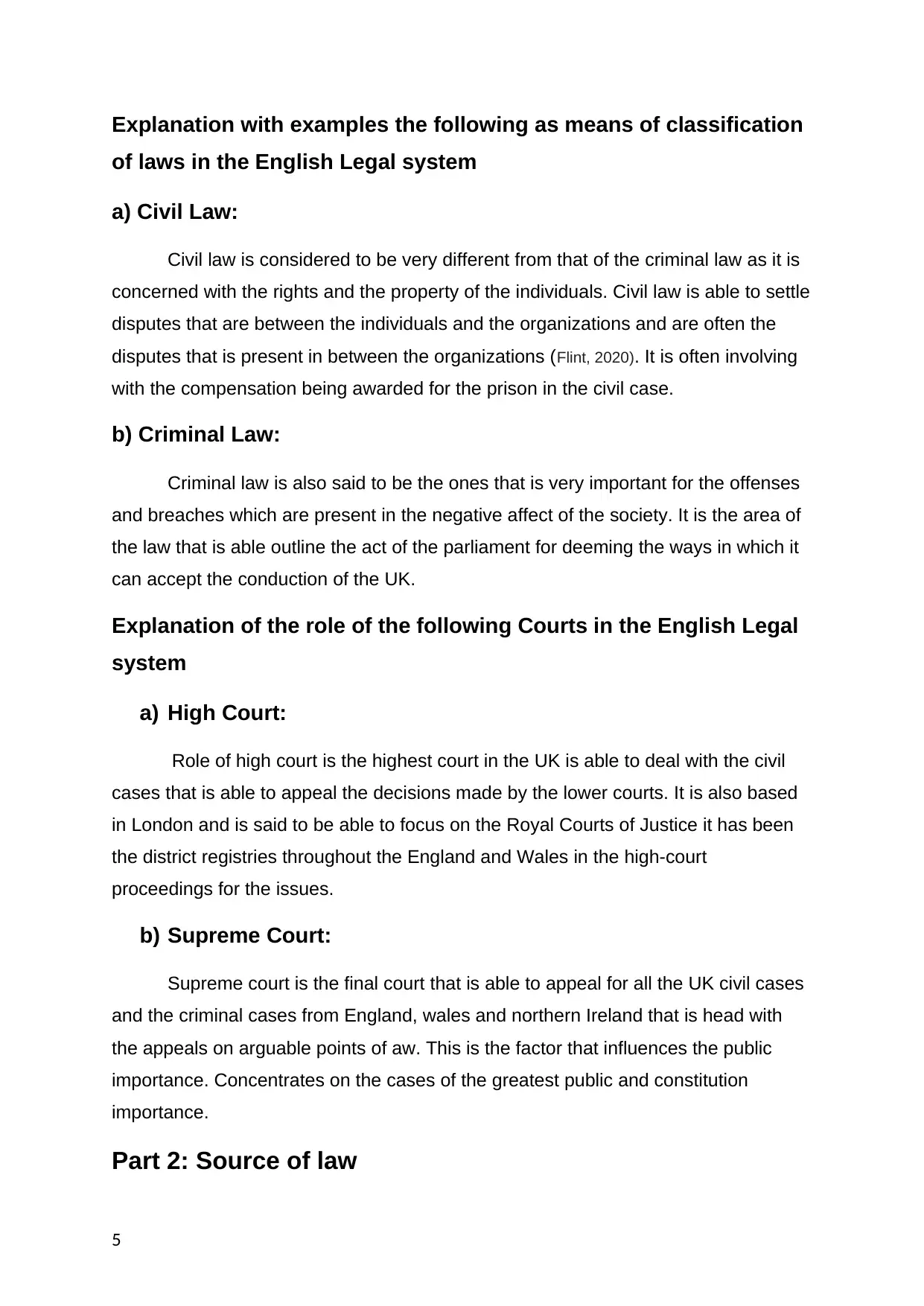
Explanation with examples the following as means of classification
of laws in the English Legal system
a) Civil Law:
Civil law is considered to be very different from that of the criminal law as it is
concerned with the rights and the property of the individuals. Civil law is able to settle
disputes that are between the individuals and the organizations and are often the
disputes that is present in between the organizations (Flint, 2020). It is often involving
with the compensation being awarded for the prison in the civil case.
b) Criminal Law:
Criminal law is also said to be the ones that is very important for the offenses
and breaches which are present in the negative affect of the society. It is the area of
the law that is able outline the act of the parliament for deeming the ways in which it
can accept the conduction of the UK.
Explanation of the role of the following Courts in the English Legal
system
a) High Court:
Role of high court is the highest court in the UK is able to deal with the civil
cases that is able to appeal the decisions made by the lower courts. It is also based
in London and is said to be able to focus on the Royal Courts of Justice it has been
the district registries throughout the England and Wales in the high-court
proceedings for the issues.
b) Supreme Court:
Supreme court is the final court that is able to appeal for all the UK civil cases
and the criminal cases from England, wales and northern Ireland that is head with
the appeals on arguable points of aw. This is the factor that influences the public
importance. Concentrates on the cases of the greatest public and constitution
importance.
Part 2: Source of law
5
of laws in the English Legal system
a) Civil Law:
Civil law is considered to be very different from that of the criminal law as it is
concerned with the rights and the property of the individuals. Civil law is able to settle
disputes that are between the individuals and the organizations and are often the
disputes that is present in between the organizations (Flint, 2020). It is often involving
with the compensation being awarded for the prison in the civil case.
b) Criminal Law:
Criminal law is also said to be the ones that is very important for the offenses
and breaches which are present in the negative affect of the society. It is the area of
the law that is able outline the act of the parliament for deeming the ways in which it
can accept the conduction of the UK.
Explanation of the role of the following Courts in the English Legal
system
a) High Court:
Role of high court is the highest court in the UK is able to deal with the civil
cases that is able to appeal the decisions made by the lower courts. It is also based
in London and is said to be able to focus on the Royal Courts of Justice it has been
the district registries throughout the England and Wales in the high-court
proceedings for the issues.
b) Supreme Court:
Supreme court is the final court that is able to appeal for all the UK civil cases
and the criminal cases from England, wales and northern Ireland that is head with
the appeals on arguable points of aw. This is the factor that influences the public
importance. Concentrates on the cases of the greatest public and constitution
importance.
Part 2: Source of law
5
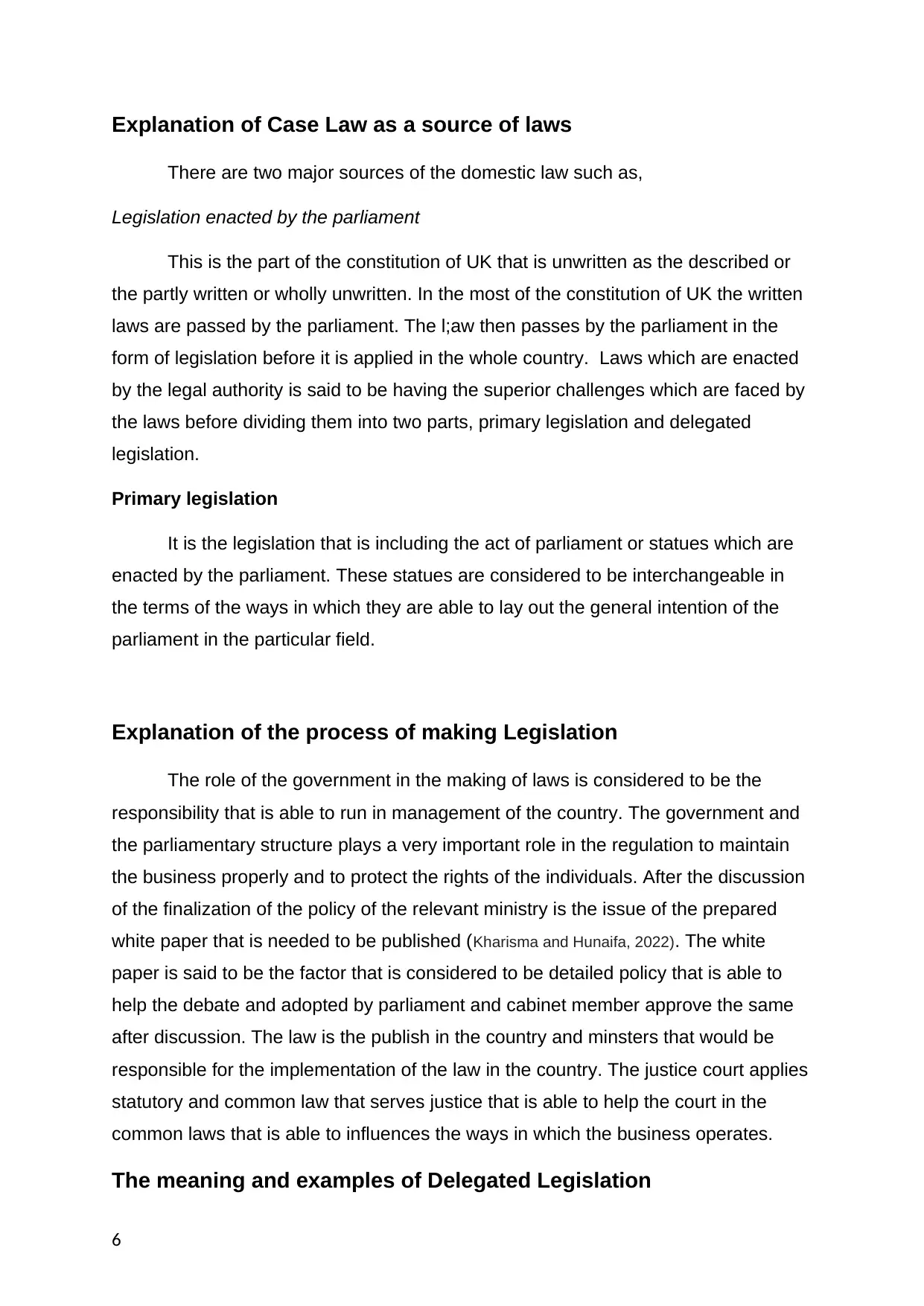
Explanation of Case Law as a source of laws
There are two major sources of the domestic law such as,
Legislation enacted by the parliament
This is the part of the constitution of UK that is unwritten as the described or
the partly written or wholly unwritten. In the most of the constitution of UK the written
laws are passed by the parliament. The l;aw then passes by the parliament in the
form of legislation before it is applied in the whole country. Laws which are enacted
by the legal authority is said to be having the superior challenges which are faced by
the laws before dividing them into two parts, primary legislation and delegated
legislation.
Primary legislation
It is the legislation that is including the act of parliament or statues which are
enacted by the parliament. These statues are considered to be interchangeable in
the terms of the ways in which they are able to lay out the general intention of the
parliament in the particular field.
Explanation of the process of making Legislation
The role of the government in the making of laws is considered to be the
responsibility that is able to run in management of the country. The government and
the parliamentary structure plays a very important role in the regulation to maintain
the business properly and to protect the rights of the individuals. After the discussion
of the finalization of the policy of the relevant ministry is the issue of the prepared
white paper that is needed to be published (Kharisma and Hunaifa, 2022). The white
paper is said to be the factor that is considered to be detailed policy that is able to
help the debate and adopted by parliament and cabinet member approve the same
after discussion. The law is the publish in the country and minsters that would be
responsible for the implementation of the law in the country. The justice court applies
statutory and common law that serves justice that is able to help the court in the
common laws that is able to influences the ways in which the business operates.
The meaning and examples of Delegated Legislation
6
There are two major sources of the domestic law such as,
Legislation enacted by the parliament
This is the part of the constitution of UK that is unwritten as the described or
the partly written or wholly unwritten. In the most of the constitution of UK the written
laws are passed by the parliament. The l;aw then passes by the parliament in the
form of legislation before it is applied in the whole country. Laws which are enacted
by the legal authority is said to be having the superior challenges which are faced by
the laws before dividing them into two parts, primary legislation and delegated
legislation.
Primary legislation
It is the legislation that is including the act of parliament or statues which are
enacted by the parliament. These statues are considered to be interchangeable in
the terms of the ways in which they are able to lay out the general intention of the
parliament in the particular field.
Explanation of the process of making Legislation
The role of the government in the making of laws is considered to be the
responsibility that is able to run in management of the country. The government and
the parliamentary structure plays a very important role in the regulation to maintain
the business properly and to protect the rights of the individuals. After the discussion
of the finalization of the policy of the relevant ministry is the issue of the prepared
white paper that is needed to be published (Kharisma and Hunaifa, 2022). The white
paper is said to be the factor that is considered to be detailed policy that is able to
help the debate and adopted by parliament and cabinet member approve the same
after discussion. The law is the publish in the country and minsters that would be
responsible for the implementation of the law in the country. The justice court applies
statutory and common law that serves justice that is able to help the court in the
common laws that is able to influences the ways in which the business operates.
The meaning and examples of Delegated Legislation
6
⊘ This is a preview!⊘
Do you want full access?
Subscribe today to unlock all pages.

Trusted by 1+ million students worldwide
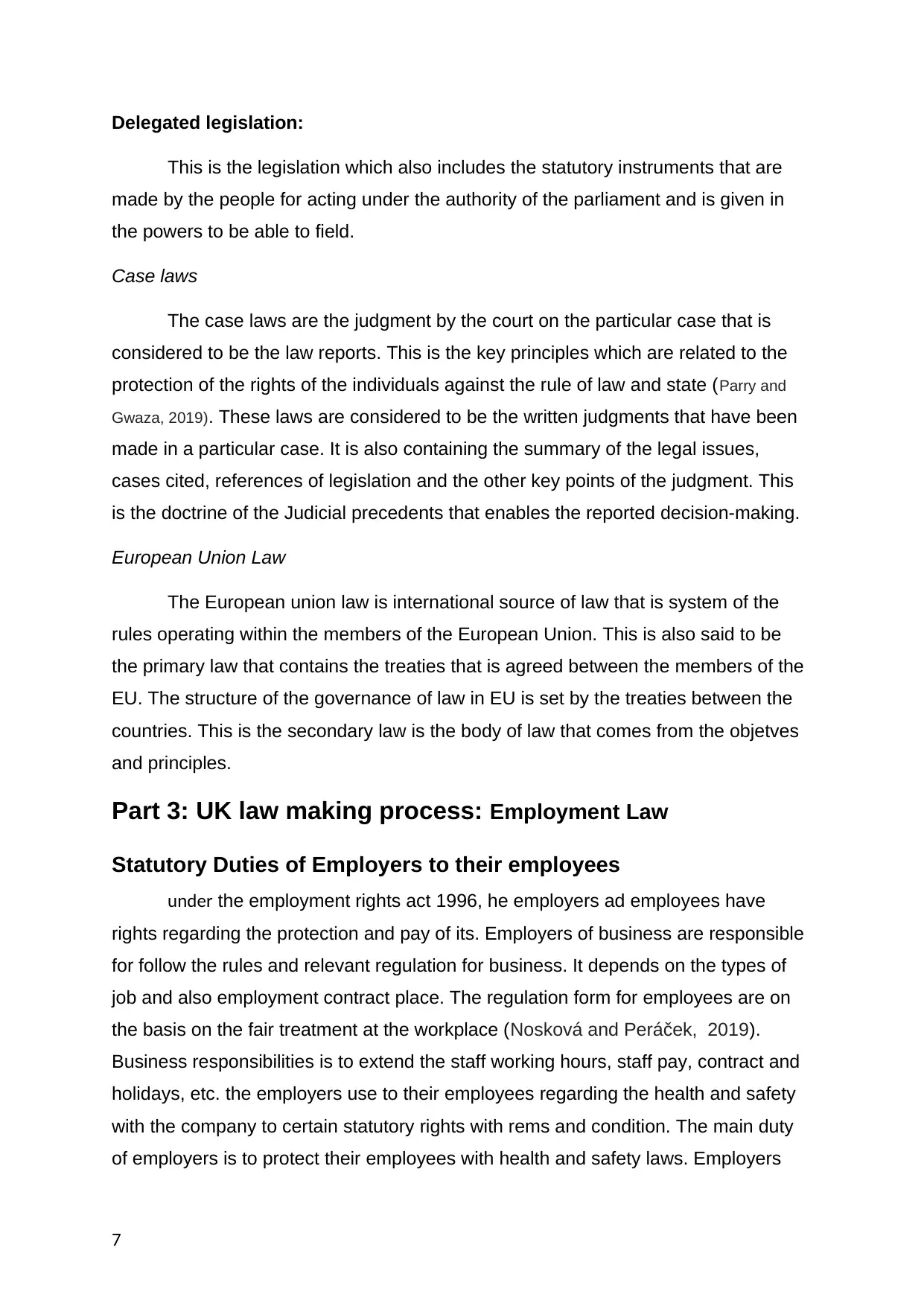
Delegated legislation:
This is the legislation which also includes the statutory instruments that are
made by the people for acting under the authority of the parliament and is given in
the powers to be able to field.
Case laws
The case laws are the judgment by the court on the particular case that is
considered to be the law reports. This is the key principles which are related to the
protection of the rights of the individuals against the rule of law and state (Parry and
Gwaza, 2019). These laws are considered to be the written judgments that have been
made in a particular case. It is also containing the summary of the legal issues,
cases cited, references of legislation and the other key points of the judgment. This
is the doctrine of the Judicial precedents that enables the reported decision-making.
European Union Law
The European union law is international source of law that is system of the
rules operating within the members of the European Union. This is also said to be
the primary law that contains the treaties that is agreed between the members of the
EU. The structure of the governance of law in EU is set by the treaties between the
countries. This is the secondary law is the body of law that comes from the objetves
and principles.
Part 3: UK law making process: Employment Law
Statutory Duties of Employers to their employees
under the employment rights act 1996, he employers ad employees have
rights regarding the protection and pay of its. Employers of business are responsible
for follow the rules and relevant regulation for business. It depends on the types of
job and also employment contract place. The regulation form for employees are on
the basis on the fair treatment at the workplace (Nosková and Peráček, 2019).
Business responsibilities is to extend the staff working hours, staff pay, contract and
holidays, etc. the employers use to their employees regarding the health and safety
with the company to certain statutory rights with rems and condition. The main duty
of employers is to protect their employees with health and safety laws. Employers
7
This is the legislation which also includes the statutory instruments that are
made by the people for acting under the authority of the parliament and is given in
the powers to be able to field.
Case laws
The case laws are the judgment by the court on the particular case that is
considered to be the law reports. This is the key principles which are related to the
protection of the rights of the individuals against the rule of law and state (Parry and
Gwaza, 2019). These laws are considered to be the written judgments that have been
made in a particular case. It is also containing the summary of the legal issues,
cases cited, references of legislation and the other key points of the judgment. This
is the doctrine of the Judicial precedents that enables the reported decision-making.
European Union Law
The European union law is international source of law that is system of the
rules operating within the members of the European Union. This is also said to be
the primary law that contains the treaties that is agreed between the members of the
EU. The structure of the governance of law in EU is set by the treaties between the
countries. This is the secondary law is the body of law that comes from the objetves
and principles.
Part 3: UK law making process: Employment Law
Statutory Duties of Employers to their employees
under the employment rights act 1996, he employers ad employees have
rights regarding the protection and pay of its. Employers of business are responsible
for follow the rules and relevant regulation for business. It depends on the types of
job and also employment contract place. The regulation form for employees are on
the basis on the fair treatment at the workplace (Nosková and Peráček, 2019).
Business responsibilities is to extend the staff working hours, staff pay, contract and
holidays, etc. the employers use to their employees regarding the health and safety
with the company to certain statutory rights with rems and condition. The main duty
of employers is to protect their employees with health and safety laws. Employers
7
Paraphrase This Document
Need a fresh take? Get an instant paraphrase of this document with our AI Paraphraser
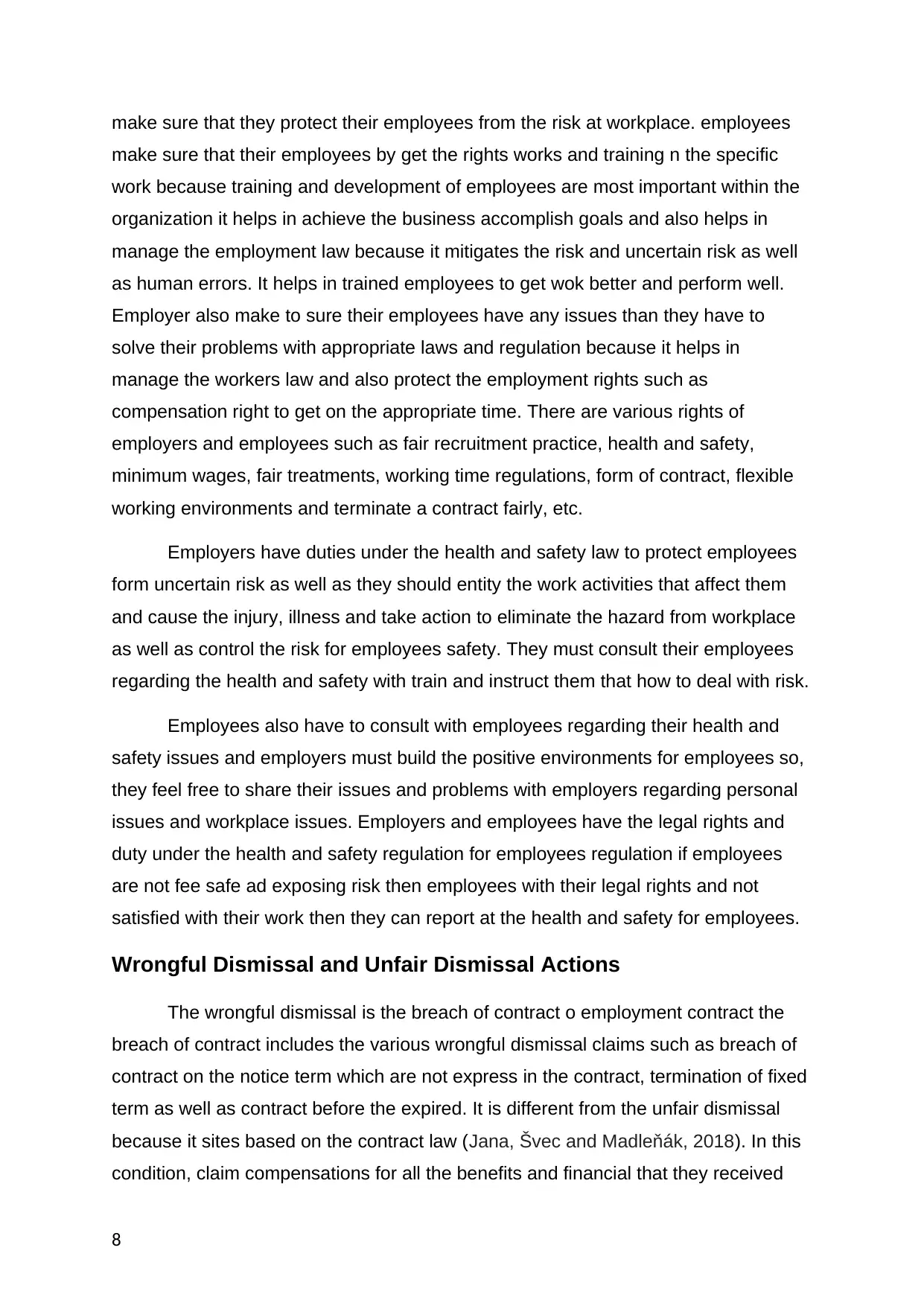
make sure that they protect their employees from the risk at workplace. employees
make sure that their employees by get the rights works and training n the specific
work because training and development of employees are most important within the
organization it helps in achieve the business accomplish goals and also helps in
manage the employment law because it mitigates the risk and uncertain risk as well
as human errors. It helps in trained employees to get wok better and perform well.
Employer also make to sure their employees have any issues than they have to
solve their problems with appropriate laws and regulation because it helps in
manage the workers law and also protect the employment rights such as
compensation right to get on the appropriate time. There are various rights of
employers and employees such as fair recruitment practice, health and safety,
minimum wages, fair treatments, working time regulations, form of contract, flexible
working environments and terminate a contract fairly, etc.
Employers have duties under the health and safety law to protect employees
form uncertain risk as well as they should entity the work activities that affect them
and cause the injury, illness and take action to eliminate the hazard from workplace
as well as control the risk for employees safety. They must consult their employees
regarding the health and safety with train and instruct them that how to deal with risk.
Employees also have to consult with employees regarding their health and
safety issues and employers must build the positive environments for employees so,
they feel free to share their issues and problems with employers regarding personal
issues and workplace issues. Employers and employees have the legal rights and
duty under the health and safety regulation for employees regulation if employees
are not fee safe ad exposing risk then employees with their legal rights and not
satisfied with their work then they can report at the health and safety for employees.
Wrongful Dismissal and Unfair Dismissal Actions
The wrongful dismissal is the breach of contract o employment contract the
breach of contract includes the various wrongful dismissal claims such as breach of
contract on the notice term which are not express in the contract, termination of fixed
term as well as contract before the expired. It is different from the unfair dismissal
because it sites based on the contract law (Jana, Švec and Madleňák, 2018). In this
condition, claim compensations for all the benefits and financial that they received
8
make sure that their employees by get the rights works and training n the specific
work because training and development of employees are most important within the
organization it helps in achieve the business accomplish goals and also helps in
manage the employment law because it mitigates the risk and uncertain risk as well
as human errors. It helps in trained employees to get wok better and perform well.
Employer also make to sure their employees have any issues than they have to
solve their problems with appropriate laws and regulation because it helps in
manage the workers law and also protect the employment rights such as
compensation right to get on the appropriate time. There are various rights of
employers and employees such as fair recruitment practice, health and safety,
minimum wages, fair treatments, working time regulations, form of contract, flexible
working environments and terminate a contract fairly, etc.
Employers have duties under the health and safety law to protect employees
form uncertain risk as well as they should entity the work activities that affect them
and cause the injury, illness and take action to eliminate the hazard from workplace
as well as control the risk for employees safety. They must consult their employees
regarding the health and safety with train and instruct them that how to deal with risk.
Employees also have to consult with employees regarding their health and
safety issues and employers must build the positive environments for employees so,
they feel free to share their issues and problems with employers regarding personal
issues and workplace issues. Employers and employees have the legal rights and
duty under the health and safety regulation for employees regulation if employees
are not fee safe ad exposing risk then employees with their legal rights and not
satisfied with their work then they can report at the health and safety for employees.
Wrongful Dismissal and Unfair Dismissal Actions
The wrongful dismissal is the breach of contract o employment contract the
breach of contract includes the various wrongful dismissal claims such as breach of
contract on the notice term which are not express in the contract, termination of fixed
term as well as contract before the expired. It is different from the unfair dismissal
because it sites based on the contract law (Jana, Švec and Madleňák, 2018). In this
condition, claim compensations for all the benefits and financial that they received
8
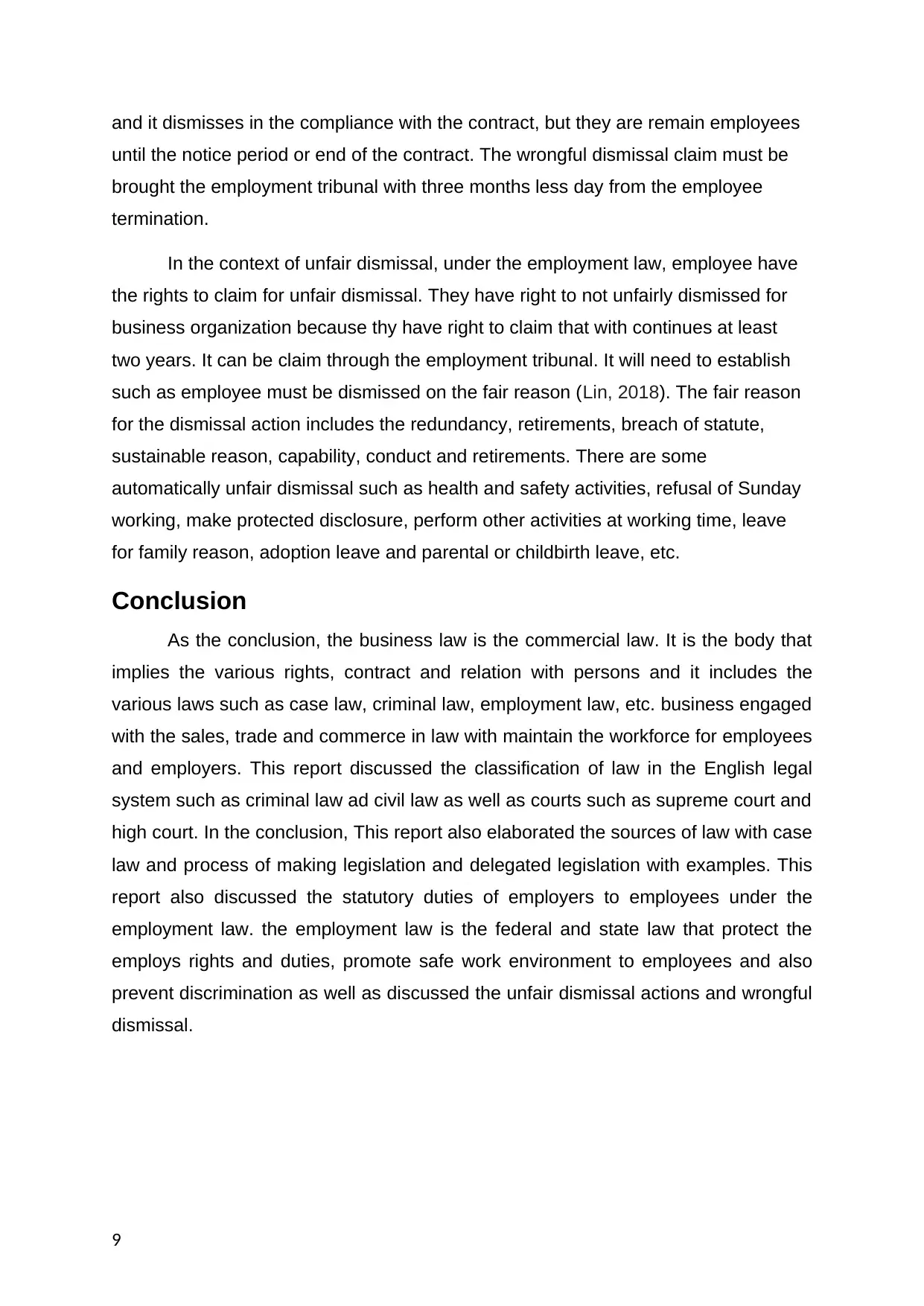
and it dismisses in the compliance with the contract, but they are remain employees
until the notice period or end of the contract. The wrongful dismissal claim must be
brought the employment tribunal with three months less day from the employee
termination.
In the context of unfair dismissal, under the employment law, employee have
the rights to claim for unfair dismissal. They have right to not unfairly dismissed for
business organization because thy have right to claim that with continues at least
two years. It can be claim through the employment tribunal. It will need to establish
such as employee must be dismissed on the fair reason (Lin, 2018). The fair reason
for the dismissal action includes the redundancy, retirements, breach of statute,
sustainable reason, capability, conduct and retirements. There are some
automatically unfair dismissal such as health and safety activities, refusal of Sunday
working, make protected disclosure, perform other activities at working time, leave
for family reason, adoption leave and parental or childbirth leave, etc.
Conclusion
As the conclusion, the business law is the commercial law. It is the body that
implies the various rights, contract and relation with persons and it includes the
various laws such as case law, criminal law, employment law, etc. business engaged
with the sales, trade and commerce in law with maintain the workforce for employees
and employers. This report discussed the classification of law in the English legal
system such as criminal law ad civil law as well as courts such as supreme court and
high court. In the conclusion, This report also elaborated the sources of law with case
law and process of making legislation and delegated legislation with examples. This
report also discussed the statutory duties of employers to employees under the
employment law. the employment law is the federal and state law that protect the
employs rights and duties, promote safe work environment to employees and also
prevent discrimination as well as discussed the unfair dismissal actions and wrongful
dismissal.
9
until the notice period or end of the contract. The wrongful dismissal claim must be
brought the employment tribunal with three months less day from the employee
termination.
In the context of unfair dismissal, under the employment law, employee have
the rights to claim for unfair dismissal. They have right to not unfairly dismissed for
business organization because thy have right to claim that with continues at least
two years. It can be claim through the employment tribunal. It will need to establish
such as employee must be dismissed on the fair reason (Lin, 2018). The fair reason
for the dismissal action includes the redundancy, retirements, breach of statute,
sustainable reason, capability, conduct and retirements. There are some
automatically unfair dismissal such as health and safety activities, refusal of Sunday
working, make protected disclosure, perform other activities at working time, leave
for family reason, adoption leave and parental or childbirth leave, etc.
Conclusion
As the conclusion, the business law is the commercial law. It is the body that
implies the various rights, contract and relation with persons and it includes the
various laws such as case law, criminal law, employment law, etc. business engaged
with the sales, trade and commerce in law with maintain the workforce for employees
and employers. This report discussed the classification of law in the English legal
system such as criminal law ad civil law as well as courts such as supreme court and
high court. In the conclusion, This report also elaborated the sources of law with case
law and process of making legislation and delegated legislation with examples. This
report also discussed the statutory duties of employers to employees under the
employment law. the employment law is the federal and state law that protect the
employs rights and duties, promote safe work environment to employees and also
prevent discrimination as well as discussed the unfair dismissal actions and wrongful
dismissal.
9
⊘ This is a preview!⊘
Do you want full access?
Subscribe today to unlock all pages.

Trusted by 1+ million students worldwide
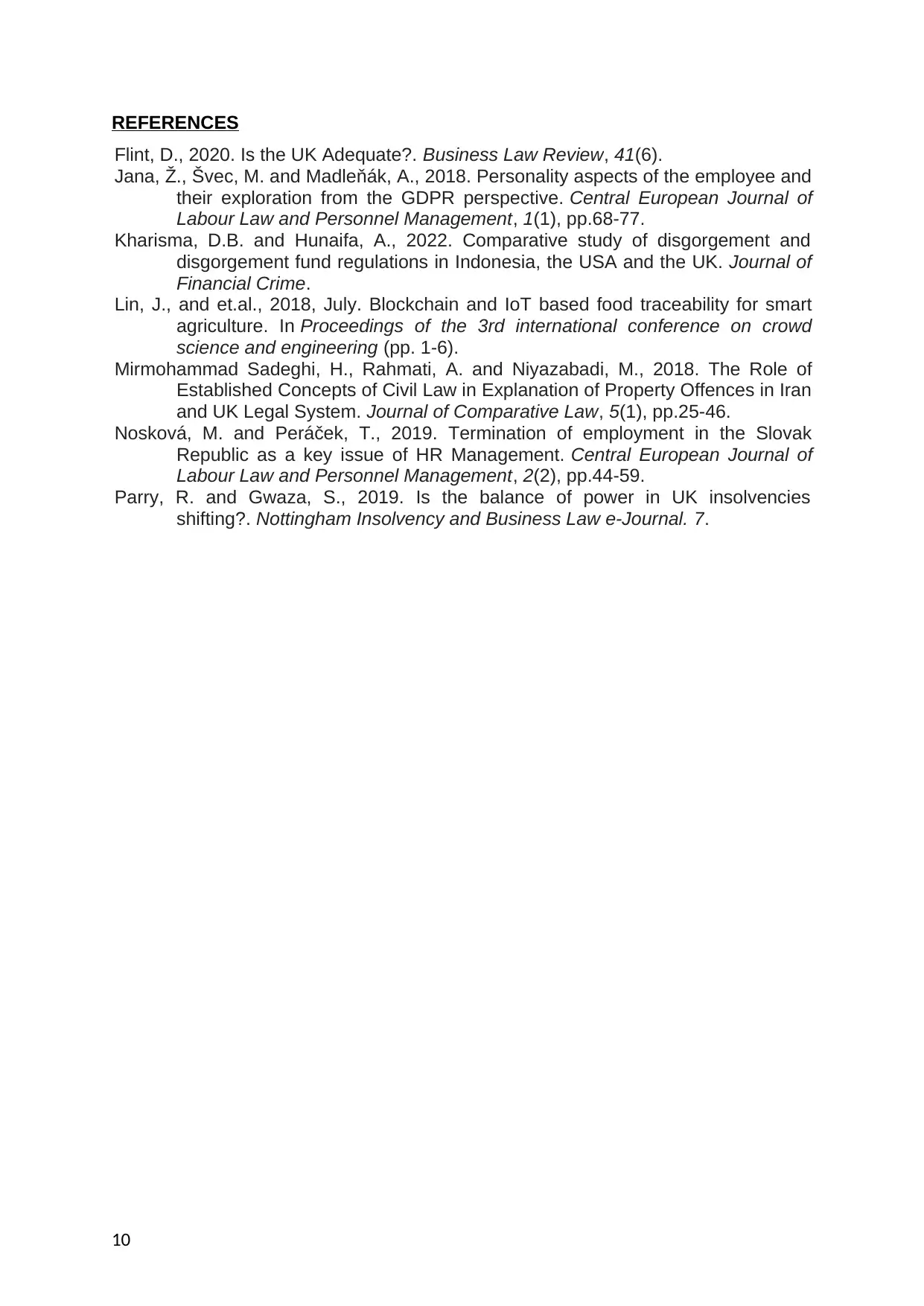
REFERENCES
Flint, D., 2020. Is the UK Adequate?. Business Law Review, 41(6).
Jana, Ž., Švec, M. and Madleňák, A., 2018. Personality aspects of the employee and
their exploration from the GDPR perspective. Central European Journal of
Labour Law and Personnel Management, 1(1), pp.68-77.
Kharisma, D.B. and Hunaifa, A., 2022. Comparative study of disgorgement and
disgorgement fund regulations in Indonesia, the USA and the UK. Journal of
Financial Crime.
Lin, J., and et.al., 2018, July. Blockchain and IoT based food traceability for smart
agriculture. In Proceedings of the 3rd international conference on crowd
science and engineering (pp. 1-6).
Mirmohammad Sadeghi, H., Rahmati, A. and Niyazabadi, M., 2018. The Role of
Established Concepts of Civil Law in Explanation of Property Offences in Iran
and UK Legal System. Journal of Comparative Law, 5(1), pp.25-46.
Nosková, M. and Peráček, T., 2019. Termination of employment in the Slovak
Republic as a key issue of HR Management. Central European Journal of
Labour Law and Personnel Management, 2(2), pp.44-59.
Parry, R. and Gwaza, S., 2019. Is the balance of power in UK insolvencies
shifting?. Nottingham Insolvency and Business Law e-Journal. 7.
10
Flint, D., 2020. Is the UK Adequate?. Business Law Review, 41(6).
Jana, Ž., Švec, M. and Madleňák, A., 2018. Personality aspects of the employee and
their exploration from the GDPR perspective. Central European Journal of
Labour Law and Personnel Management, 1(1), pp.68-77.
Kharisma, D.B. and Hunaifa, A., 2022. Comparative study of disgorgement and
disgorgement fund regulations in Indonesia, the USA and the UK. Journal of
Financial Crime.
Lin, J., and et.al., 2018, July. Blockchain and IoT based food traceability for smart
agriculture. In Proceedings of the 3rd international conference on crowd
science and engineering (pp. 1-6).
Mirmohammad Sadeghi, H., Rahmati, A. and Niyazabadi, M., 2018. The Role of
Established Concepts of Civil Law in Explanation of Property Offences in Iran
and UK Legal System. Journal of Comparative Law, 5(1), pp.25-46.
Nosková, M. and Peráček, T., 2019. Termination of employment in the Slovak
Republic as a key issue of HR Management. Central European Journal of
Labour Law and Personnel Management, 2(2), pp.44-59.
Parry, R. and Gwaza, S., 2019. Is the balance of power in UK insolvencies
shifting?. Nottingham Insolvency and Business Law e-Journal. 7.
10
1 out of 10
Related Documents
Your All-in-One AI-Powered Toolkit for Academic Success.
+13062052269
info@desklib.com
Available 24*7 on WhatsApp / Email
![[object Object]](/_next/static/media/star-bottom.7253800d.svg)
Unlock your academic potential
© 2024 | Zucol Services PVT LTD | All rights reserved.



